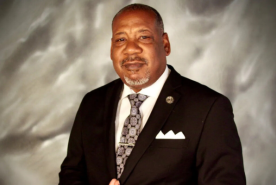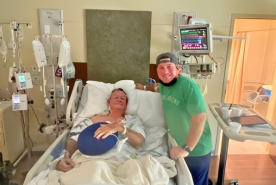June 18, 2020
By Matthew Cooper, M.D., and Lara Tushla
While COVID-19 has put many things on hold (school, work, travel and a multitude of life celebrations), it has not slowed down kidney disease. In fact, the rates of Acute Kidney Injury AKI) have increased dramatically and many of these AKI patients could develop chronic kidney disease (CKD) down the road.
As the pandemic spread across the country, many transplant programs dramatically decreased activity levels at all stages, from initial visits to the transplant center for a discussion about transplant options, to evaluation testing, to living donor testing, to transplant surgery, as well as follow-up visits. There are many good reasons for implementing those limitations, even though organ transplant has remained one of the non-elective essential surgeries.
Recently several members of the NKF Public Policy Committee had a call with representatives from the Health Resources and Service Administration’s (HRSA) Division of Transplant (DoT). Listening to our colleagues Mary, Derek, and Haley tell their stories of the impact that dialysis and transplant have had on their lives was a powerful reminder that while there remain a lot of unknowns about the COVID-19 virus in the context of transplant, not receiving a timely transplant brings its own set of unknowns.
In a perfect world, the decision to accept a specific kidney from a specific donor at a specific time would be made between patients and their healthcare teams. While kidney transplant can be life-enhancing and prolonging, it is clear that those on the Public Policy Committee who live on the “patient” side of things see it as lifesaving in very real ways. The life that they have had since they received their transplants would not have been possible without that gift.
While HRSA’s DoT group made it clear that they were in “listening mode,” they were clearly impacted by the lived experiences of our members. We all know that people living with kidney disease are not just numbers on a chart or outcomes statistics but possess personal stories that can be so much more impactful.
From the literature we know that people who have a functioning transplant:
- On average live 2.4-2.9 times as long as their gender and age matched peers receiving dialysis.
- Enjoy significantly higher quality of life than people receiving dialysis.
The patient advocates who joined the call shared that in their post-transplant life they were able to:
- Continue their education and build a career focused on advocating for others.
- Raise a family and celebrate a multitude of wonderful life events.
- Pave the way for other people with CKD by sharing hard learned lessons of the CKD world.
- Keep the issues people with CKD face in front of patients, providers and elected officials.
- Take nothing for granted. Cherish every day.
There is a parable about a group of blind people who are led to different parts of an elephant. They cannot tell what it is because the only feel their part – the one touching its side thinks it’s a wall, the one touching the trunk thinks it’s a snake; the one touching the leg thinks it’s a tree. Only by sharing what they have learned do they realize it is an elephant. When the NKF developed the Public Policy Committee, it brought together a group of people who share what they have learned including their needs, wishes, challenges, perspective and expertise, in order to more fully see a given situation so that a comprehensive plan can be developed.
Matthew Cooper, M.D., is the Director of Kidney and Pancreas Transplantation at Medstar Georgetown Transplant Institute and Professor of Surgery at Georgetown University School of Medicine. He serves on NKF’s National Board of Directors and is a member of NKF's Public Policy Committee.
Lara Tushla is a kidney and pancreas social worker at Chicago’s Rush University Medical Center. She has experience in many phases of CKD including previous work as a dialysis social worker and serves on NKF's Public Policy Committee.


















